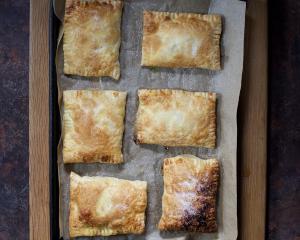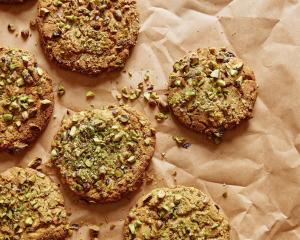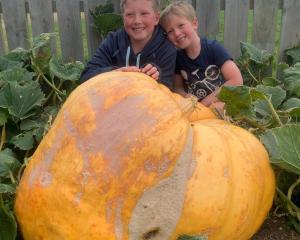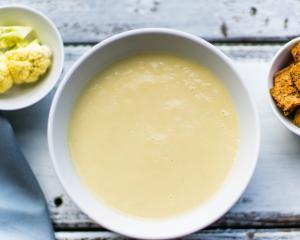Invercargill chef/restaurateur Graham Hawkes' career has come full circle.
The chef of 50 years who once competed in the Culinary Olympics in Frankfurt, Germany, and later became a judge at the international culinary competition, is now taking the NZChefs Fonterra Olympic team to the event.
Mr Hawkes was one of six chefs in the 1984 New Zealand team. It was the first time a New Zealand team had competed, and it turned out the team was somewhat unprepared, he said.
"We had no idea what we were getting ourselves in to.''
The United States team flew in on their own 747 with all their gear, whereas the New Zealand team transported the produce for their dishes frozen in chilli bins in a hire van, somehow losing some of it along the way, he said.
Despite their inexperience, the New Zealand team won gold in the hot kitchen section.
"It gave me a huge amount of confidence [knowing] that what we do here in New Zealand was up to Olympic standard. It also opened a huge amount of doors for me.''
It was an amazing achievement at the time, but the medal was now sitting in a drawer at home, he said.
The experience made Mr Hawkes determined to improve culinary judging standards.
In the 1984 competition, team managers were on the judging panel and some teams used artists to create decorations for their dishes, giving them an unfair advantage, he said.
As a result, Mr Hawkes became involved in establishing standards for culinary judging in New Zealand - the first country in the world to do so. He also sat on the world board for 13 years, where he helped set up world culinary judging standards in the 1990s.
"I was very involved in writing the criteria for culinary competitions so that small countries like New Zealand which had fewer resources had an equal opportunity to compete in international competitions as bigger countries like the USA.''
In 2004, Mr Hawkes returned to the Culinary Olympics to "judge the judges'' - making sure the standards were met and the competition was a level playing field for all competitors, he said.
"It was most satisfying [to see] how the judging had improved.''
Now, more than 30 years on, Mr Hawkes is heading back to the Culinary Olympics, this time in the role of mentor to a new generation of New Zealand chefs.
As NZChefs national president and chef d'mission, he is taking a team of eight top chefs, including Otago chef Corey Hume, to Erfurt, Germany in October. They will join about 2000 chefs from 40 countries for the five-day event.
New Zealand had not competed in the Culinary Olympics since 1988, due to the cost, commitment and resources needed to compete at that level, he said. However, New Zealand culinary teams had successfully competed in other international competitions closer to home, winning 36 gold medals, more than 40 silver and winning at least two competitions outright, he said.
Because of this international success, New Zealand was eligible to compete at the Culinary Olympics this year, so NZChefs decided it was time to have another "crack'' at it.
"For the New Zealand culinary team to be selected to compete in the Olympics is prestigious in its own right. The fact they haven't competed on that level for 28 years puts them on the back foot, but I am confident they will come back with a medal - hopefully the right colour.''
This time the team would be better prepared, he said.
Teams compete in two sections - creating a three-course menu for 100 patrons and 10 judges, and preparing five courses for a buffet. Each team's menu must showcase the style of food and products produced in their home country.
Practice meals have already been held around the country, with a handful more to come before the team leaves for Germany.
Mr Hawkes said the New Zealand menu was a closely guarded secret, but would include lamb, beef, salmon and venison.
The dishes served at the practice meals have included tiger prawn salad wrapped in scallop cannelloni with seared scallop, bacon powder, pickled fennel puree and sauce vierge; Akaroa salmon fillet on seaweed and vegetable salad, miso mayonnaise and gion dressing; mushroom and cream cheese pate gruyere espuma and Parmesan biscuit; and vanilla parfait with raspberry sorbet encased in sprayed chocolate on hazelnut dacquoise, coconut and popping candy, chocolate crumb, mango jelly, passionfruit curd, whipped chocolate mousse and dark chocolate fondant.
The New Zealand buffet's theme would be based on the colours of the Cardrona Valley and include a large scale The Lord of the Rings-inspired chocolate sculpture, he said.
Last month, the New Zealand team was informed the 100 tickets available for its three-course menu had sold out - one of only 10 countries' menus to do so so far.
"[Diners] have chosen the New Zealand cuisine as the one they want to eat. It will be hard to live up to, but it is amazing for New Zealand ... absolutely incredible.''
The fact the New Zealand tickets had sold out suggested there was a huge demand for New Zealand food in Europe, which was great for the country's tourism market, and created an opportunity for New Zealand to become a culinary destination, he said.
-By Petrina Wright











